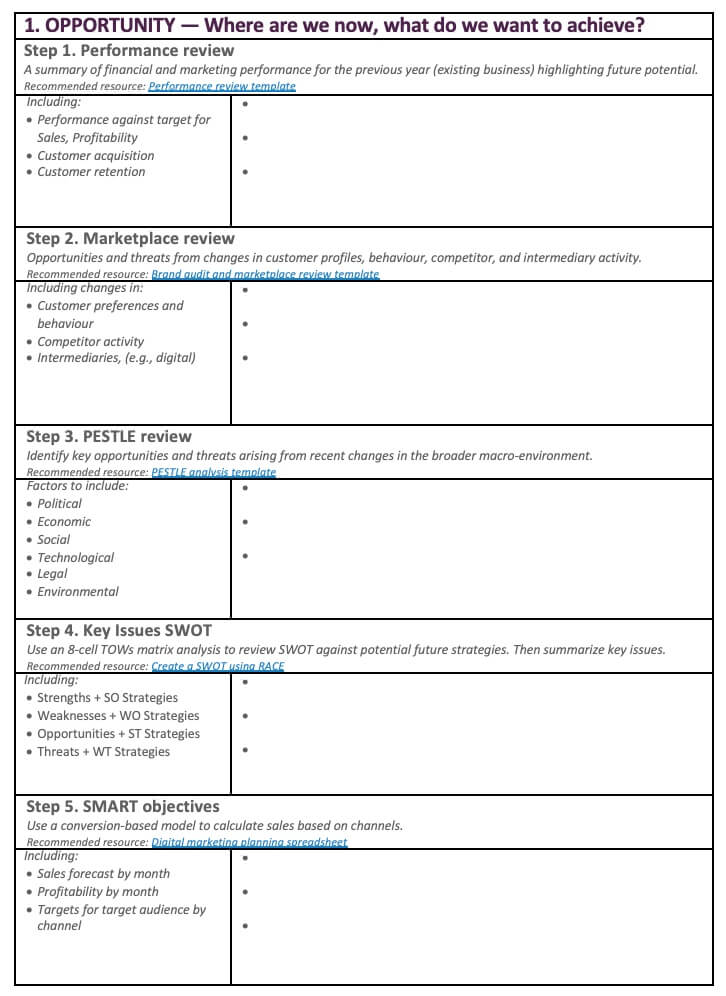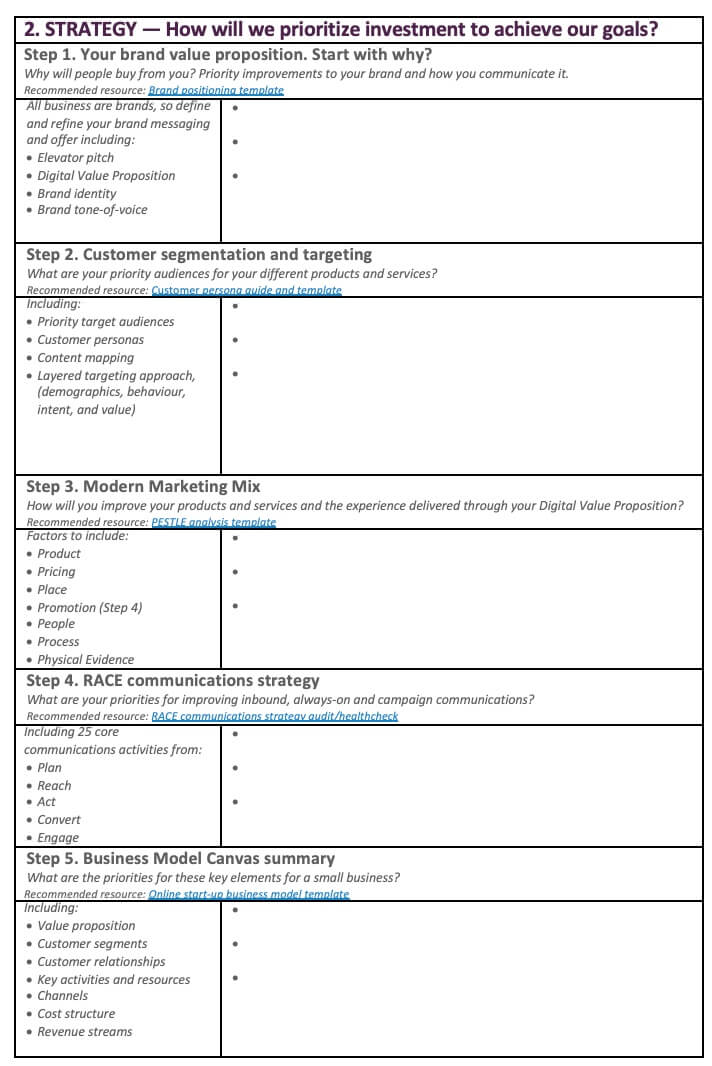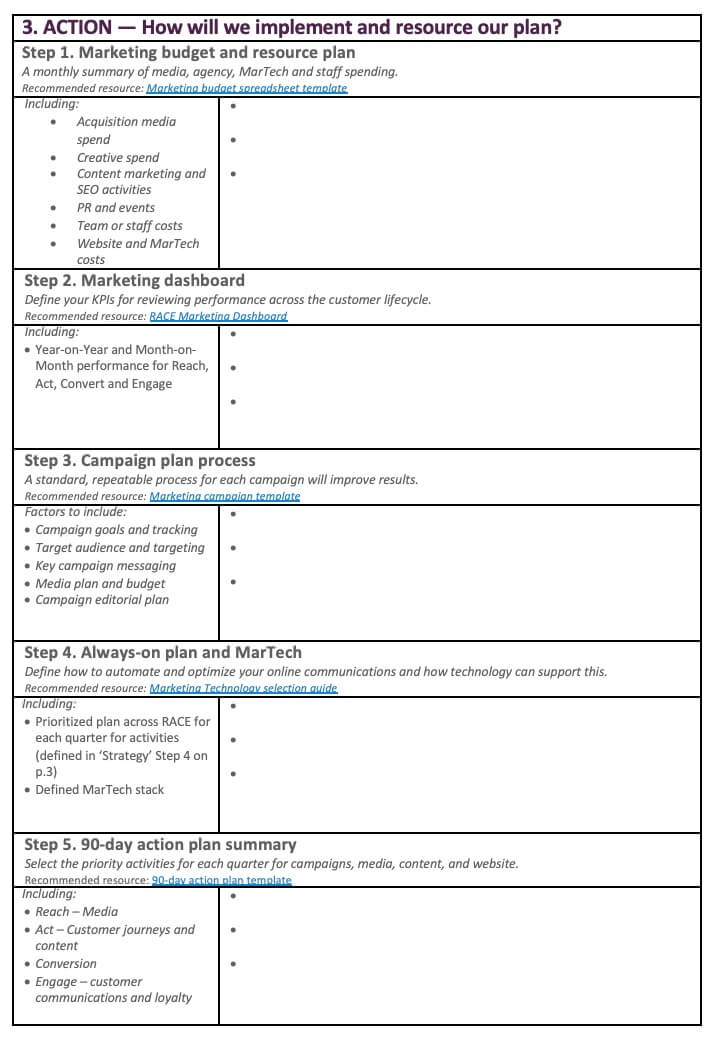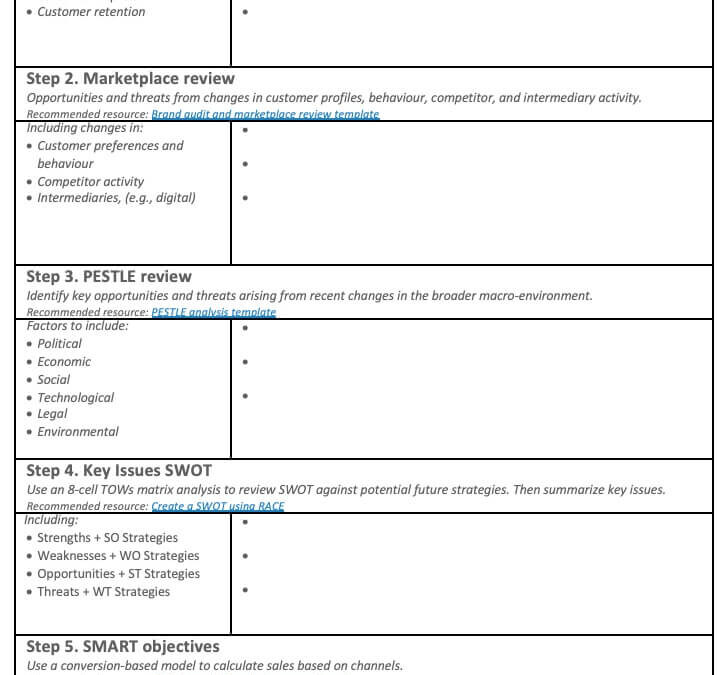Use our simple, 15 section download to quickly create a marketing plan for your business
Many marketing plan templates you will find online were created long ago for larger businesses and aren’t so relevant to small and startup business competing in today’s marketplace where effective digital marketing is essential. Long plans with sections labelled ‘mission and vision statement’ and ‘corporate strategies’ are irrelevant for smaller businesses. The template we recommend in this post is far more practical since it relates to the real-world challenges and opportunities of a small business.
In this post, we’ll recommend what needs to go into a marketing plan and how to structure it. At the end of the article we link to a Word document you can download to write your own plan.
What is a marketing plan?
A marketing plan is an essential tool to compete and grow your business since it gives focus to your marketing activities by setting realistic, achievable priorities within your budget. It simply defines what you want to gain from your investment in marketing and how you will achieve these goals through selecting the best marketing strategies and channels to acquire and retain customers.
About Smart Insights
Since we launched in 2010, we’re proud to have supported the growth of many businesses by reducing their need for costly consultants or agencies. Our self-service Learning Path platform and actionable templates are aimed at making it quick for you to learn what you need to and then rapidly take action. Our RACE Growth System provides a simple, yet comprehensive framework to plan, manage and optimize your marketing communications with a focus on the digital marketing activities that are fundamental to future success.
About this template
The template shares the key features of our RACE Growth system since it is designed to be:
- Quick to create and implement an actionable plan with simple steps
- Data-driven, defining SMART objectives based on forecasts
- Practical to implement using a 90-day planning approach to give you focus
- Designed for smaller businesses, but relevant for larger businesses too.
Structure of this marketing plan template
This template is structured around the OSA process, of which you can see examples in different sectors in our editable Word plan templates, is structured in three parts:
- Opportunity: Situation review including marketplace analysis (customers, competitors and channel partners), performance analysis and SMART Objective setting based on forecasting (spreadsheet tools available in our templates)
- Strategy: Segmentation, Targeting and Positoning (STP) and the tactics forming the 7Ps of the marketing mix.
- Action: Budget, resourcing including team and tools and marketing technology (Martech) and 90-day action plans.
For each of the three parts there are 5-steps relevant for every small business.
Section 1. OPPORTUNITY — Where are we now, what do we want to achieve?

Step 1. Performance review
A summary of financial and marketing performance for the previous year (existing business) highlighting future potential.
Including:
• Performance against target for Sales, Profitability
• Customer acquisition
• Customer retention
Recommended resource: Performance review template
Step 2. Marketplace review
Opportunities and threats from changes in customer profiles, behaviour, competitor, and intermediary activity.
Including changes in:
• Customer preferences and behaviour
• Competitor activity
• Intermediaries, (e.g., digital)
Recommended resource: Brand audit and marketplace review template
Step 3. PESTLE review
Identify key opportunities and threats arising from recent changes in the broader macro-environment.
Factors to include:
• Political
• Economic
• Social
• Technological
• Legal
• Environmental
Recommended resource: PESTLE analysis template
Step 4. Key Issues SWOT
Use an 8-cell TOWs matrix analysis to review SWOT against potential future strategies. Then summarize key issues. Including:
• Strengths + SO Strategies
• Weaknesses + WO Strategies
• Opportunities + ST Strategies
• Threats + WT Strategies
Recommended resource: Create a SWOT using RACE
Step 5. SMART objectives
Use a conversion-based model to calculate sales based on channels.
Recommended resource: Digital marketing planning spreadsheet Including:
• Sales forecast by month
• Profitability by month
• Targets for target audience by channel
Recommended resource: Digital marketing planning spreadsheet
2. STRATEGY — How will we prioritize investment to achieve our goals?

Step 1. Your brand value proposition. Start with why?
Why will people buy from you? Priority improvements to your brand and how you communicate it.
All business are brands, so define and refine your brand messaging and offer including:
• Elevator pitch
• Digital Value Proposition
• Brand identity
• Brand tone-of-voice
Recommended resource: Brand positioning template
Step 2. Customer segmentation and targeting
What are your priority audiences for your different products and services?
Including:
• Priority target audiences
• Customer personas
• Content mapping
• Layered targeting approach, (demographics, behaviour, intent, and value)
Recommended resource: Customer persona guide and template
Step 3. Modern Marketing Mix
How will you improve your products and services and the experience delivered through your Digital Value Proposition?
Factors to include:
• Product
• Pricing
• Place
• Promotion (Step 4)
• People
• Process
• Physical Evidence
Recommended resource: PESTLE analysis template
Step 4. RACE communications strategy
What are your priorities for improving inbound, always-on and campaign communications?
Including 25 core communications activities from:
• Plan
• Reach
• Act
• Convert
•Engage
Recommended resource: RACE communications strategy audit/healthcheck
Step 5. Business Model Canvas summary
What are the priorities for these key elements for a small business?
Including:
• Value proposition
• Customer segments
• Customer relationships
• Key activities and resources
• Channels
• Cost structure
• Revenue streams
Recommended resource: Online start-up business model template
3. ACTION — How will we implement and resource our plan?

Step 1. Marketing budget and resource plan
A monthly summary of media, agency, MarTech and staff spending.
Recommended resource: Marketing budget spreadsheet template
Including:
• Acquisition media spend
• Creative spend
• Content marketing and SEO activities
• PR and events
• Team or staff costs
• Website and MarTech costs
Recommended resource: Marketing budget spreadsheet template
Step 2. Marketing dashboard
Define your KPIs for reviewing performance across the customer lifecycle.
Recommended resource: RACE Marketing Dashboard
Including:
• Year-on-Year and Month-on-Month performance for Reach, Act, Convert and Engage
Recommended resource: RACE Marketing Dashboard
Step 3. Campaign plan process
A standard, repeatable process for each campaign will improve results.
Factors to include:
• Campaign goals and tracking
• Target audience and targeting
• Key campaign messaging
• Media plan and budget
• Campaign editorial plan
Recommended resource: Marketing campaign template
Step 4. Always-on plan and MarTech
Define how to automate and optimize your online communications and how technology can support this.
Including:
• Prioritized plan across RACE for each quarter for activities
• Defined MarTech stack
Recommended resource: Marketing Technology selection guide
Step 5. 90-day action plan summary
Select the priority activities for each quarter for campaigns, media, content, and website.
Including:
• Reach – Media
• Act – Customer journeys and content
• Conversion
• Engage – customer communications and loyalty
Recommended resource: 90-day action plan template
Next Steps?
You can download the Word template here:
We hope this free template helps you quickly summarize your marketing priorities and gives you a solid basis for future growth. We’d love to support you as you refine and implement your strategy with the detailed planning templates recommended for each step.
Our Business Membership gives marketers and business owners a comprehensive library of templates and Learning Paths for a planned, structured approach to all modern marketing channels; from campaign planning and content marketing to search engine optimization and social media.


